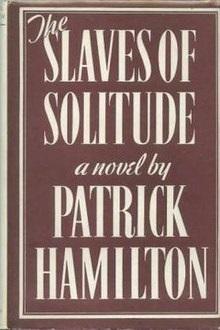
Book Review by George S: This is a book about low-level nastiness during the Second World War.
It is set in Thames Lockton, a town very like Henley-on Thames, where Patrick Hamilton spent the Second World War. In the Rosamund Tea Rooms - no longer tea rooms, but a boarding-house catering for people who have fled the London bombing. Half way through the book, a stranger takes a meal at the tea rooms, and observes the people there:
Thus looked at from outside, these guests - in this dead-and-alive dining room, of this dead-and-alive house, of this this dead-and-alive street, of this dead-and-alive little town - in the grey dead winter of the deadliest part of the most deadly war in history - thus seen from a detached point of view, they presented an extraordinary spectacle. [...] They didn't talk, they didn't laugh, they didn't seem to enjoy their food, they didn't seem to go out, they didn't seem to have any interests, they didn't seem to like each other much, they didn't even seem to hate each other, they didn't seem to do anything.
But he's wrong - they do hate each other. They are all people who have been uprooted (mostly by the war) away from family and friends, into close conjunction in the boarding house, where they grate on one another. The motto of the novel could be Jean-Paul Sartre's 'Hell is other people.' The central character is Miss Roach - always called that. She has a Christian name (Enid) but she dislikes it. She is a conventional middle-class woman approaching forty,well aware that her life-chances are diminishing. She shares a table at the Tea-Rooms with, among others, the horrible Mr Thwaites, an elderly man who uses a lumberingly facetious style of speech to bully her. He often speaks in what Miss Roach privately calls the language of Quoth - cliches larded with fake mediaevalism out of a bad historical novel: describing a good-looking woman he says 'Certes, the damsel doth not offend the organs of optical vision.' But underneath the heavy humour there is always a subtext of aggression, as he picks on the one whom he sees as most vulnerable - Miss Roach. (The fact that his remarks are heavily signaled to be humorous makes it, of course, difficult for her to object to them.)
She makes friends with an American officer, the Lieutenant, who takes her to the pub and kisses her, and proposes marriage in a vague and inconsequential way. She is not particualerly attracted to him, but finds his kisses not unpleasant, and wonders what it would be like to be married to him while he ran his laundry business in the mid-west. .
Miss Roach's big mistake is to help an acquaintance, Vicki, a German woman of roughly her own age, to move into the Tea Rooms. This upsets the balance of things. Vicki charms Mr Thwaites, and the two form an alliance against Miss Roach. She also steals the Lieutenant from Miss Roach. Vicki too has verbal peculiarities - a foreign accent that is partly genuine and partly for effect. Miss Roach's attitude to Vicki started as rather condescending kindness; it becomes dislike and finally hatred.
Tensions increase at the Tea rooms, and they come to a head at Christmas, ('Ah- that Christmas! That Christmas of hatred, fear, pain, terror and disgrace!') The gin and whisky flow, words are said and unforgivable insinuations made, and it ends in a small but decisive act of violence.
The war is always there in the background, as a dispiriting, demoralising presence:
Dawn, slowly filling Church street with grey light, disclosed another day of war.[...] It seemed that dawn itself had been grimly harnessed to the war effort, made to alter its normal mode of existence, had been Bevin-conscripted.
Miss Roach feels 'the endless snubbing and nagging of war' - shortages, surliness, and bossy posters ordering her about:
She was not to waste bread, she was not to use unnecessary fuel, she wass not to leave litter about, she was not to telephone other than briefly, she was not to take the journey she was taking unless it was really necessary [...] She was not even to talk carelessly lest she endangered the lives of others.
The war also brings Americans to Thames Lockton, especially the Lieutenant, for whom the war is a space out of his actual life, so he spends it chasing women and proposing to them indiscriminately. The word that Hamilton and Miss Roach have for him is 'inconsequential'. He is a catalyst that gets poisonous reactions going without meaning to.
There is another character, Mr Prest, an elderly actor who sits apart in the Rosamund's dining-room, takes no part in the aggression, and observes. Michael Holroyd, in his foreword to the novel, suggests that this is a Hamilton's self-portrait. Mr Prest is allowed a moment of glory towards the end of the book, when he gets a job in a pantomime, and Miss Roach sees him sending an audience of children into frenzies of laughter, and creating an atmosphere of joy. Miss Roach has a vision of him as the artist, 'the purified and purified being' who can give respite from the darkness and dreariness of the war.
I've seen Hamilton described as a forbear of Harold Pinter, with his ear for the comedy of menace, and for the nasty subtext underlying apparently polite conversation. Yes, I can see that. I think it's a terrific novel.
